
BIOLOGY AND FERTILITY OF SOILS
Scope & Guideline
Unlocking the Secrets of Soil Biology and Fertility
Introduction
Aims and Scopes
- Soil Microbial Dynamics:
Research on the composition, diversity, and functions of soil microbial communities, including their interactions with plants and soil properties. - Nutrient Cycling:
Studies on nitrogen, phosphorus, and carbon cycling in soils, with a focus on microbial processes that influence nutrient availability and retention. - Soil Management Practices:
Investigations into the effects of various agricultural practices (e.g., organic amendments, tillage, cover cropping) on soil health and fertility. - Environmental Impacts:
Exploration of how soil biology contributes to ecosystem services, including the mitigation of greenhouse gas emissions and soil degradation. - Soil-Plant Interactions:
Examination of the relationships between soil health, microbial communities, and plant growth, including the role of mycorrhizae and rhizobacteria.
Trending and Emerging
- Microbiome and Soil Health:
Increasing research on the soil microbiome's role in promoting soil health and fertility, including studies on microbial diversity, functional groups, and their interactions with plants. - Climate Change Impacts:
Emerging studies focus on how climate change affects soil microbial processes, nutrient cycling, and greenhouse gas emissions, highlighting the need for adaptive soil management. - Sustainable Agricultural Practices:
A rise in research on sustainable practices, such as organic farming, conservation agriculture, and agroecology, emphasizing the importance of biological processes in soil fertility. - Soil Amendments and Biochar:
Growing interest in the use of organic amendments and biochar to enhance soil fertility and mitigate environmental impacts, reflecting a shift towards integrating biological solutions. - Soil-Plant Feedback Mechanisms:
Research on the feedback loops between soil health and plant performance, including how plants influence microbial communities and nutrient availability.
Declining or Waning
- Traditional Chemical Fertilization:
Research on the efficacy and impacts of chemical fertilizers has diminished as interest grows in organic and sustainable practices that focus on biological interactions. - Single-species Microbial Studies:
Studies focusing solely on individual microbial species are declining in favor of community-level analyses that consider the interactions within complex microbial ecosystems. - Static Soil Properties:
Investigations into static soil properties (e.g., texture or bulk density) are less frequent as the journal shifts towards dynamic biological processes and their implications for soil health. - Historical Soil Studies:
Research focusing on historical soil data without considering contemporary biological and ecological interactions is becoming less common. - Soil Contamination Studies:
Although still relevant, studies on soil contamination and remediation are less prominent compared to the emphasis on soil health and ecosystem services.
Similar Journals
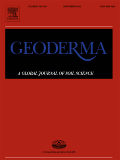
Geoderma
Advancing Knowledge in Soil and Ecosystem DynamicsGeoderma is a leading academic journal published by ELSEVIER, focused on the vital field of Soil Science. With an impressive impact factor and ranking as Q1 in its category for 2023, this journal stands as a prominent platform for researchers and professionals seeking to explore advanced scientific studies related to soil and its relationships with the ecosystem. Covering a wide range of topics from soil formation and characterization to land use and management practices, Geoderma is recognized for its rigorous peer-review process and is highly regarded within the global scientific community, as evidenced by its ranking of #12 out of 159 in the Scopus categories of Agricultural and Biological Sciences and Soil Science, placing it in the top 92nd percentile. With its inception dating back to 1967, the journal continually adapts and converges its content to meet the evolving demands of soil research until 2024 and beyond, providing invaluable insights for students, professionals, and researchers alike.

SOIL SCIENCE SOCIETY OF AMERICA JOURNAL
Elevating Soil Science to New HeightsWelcome to the SOIL SCIENCE SOCIETY OF AMERICA JOURNAL, a premier publication in the field of soil science, published by WILEY. With a distinguished history dating back to 1976, this journal has consistently provided a platform for researchers to share innovative findings and insights into soil’s critical role in agricultural and ecological systems. Featuring an impressive Q1 category ranking in Soil Science and positioned within the top 25% of its field according to Scopus, this journal is recognized for its impactful contributions to advancing our understanding of soil dynamics. While not an open-access journal, it remains a valuable resource for academics and professionals alike, with distinguished articles that meet the highest scientific standards. As it enters its converged years from 1976 to 2024, the journal aims to continue shaping the future of soil research, offering valuable knowledge to students, researchers, and practitioners dedicated to sustainable land management and environmental preservation.
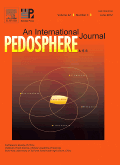
PEDOSPHERE
Bridging Disciplines to Enhance Soil UnderstandingPEDOSPHERE, published by SCIENCE PRESS, is a leading journal in the field of Soil Science, holding a prestigious position in the Q1 category as per the latest evaluations, reflecting its high impact and relevance in the domain. Established in 1996, this journal is committed to advancing our understanding of soil-related processes and their interactions with various environmental components, providing a platform for innovative and high-quality research. With an impressive rank of #13 out of 159 in the Scopus classifications for Agricultural and Biological Sciences, PEDOSPHERE reaches the 92nd percentile, indicating its significance among scholarly publications. Although the journal operates under traditional access options, it remains an essential resource for researchers, professionals, and students keen on exploring the complexities of soil dynamics and sustainability. By bridging interdisciplinary methodologies and fostering collaboration, PEDOSPHERE plays a vital role in addressing global challenges related to soil management, conservation, and ecological balance.

EGYPTIAN JOURNAL OF SOIL SCIENCE
Advancing Soil Science for Sustainable FuturesEGYPTIAN JOURNAL OF SOIL SCIENCE is a renowned publication dedicated to advancing the field of soil science, particularly within the context of Egypt and the broader regions of the Middle East and North Africa. Published by the NATIONAL INFORMATION DOCUMENTATION CENTER, ACADEMIC SCIENTIFIC RESEARCH & TECHNOLOGY, this journal aims to disseminate high-quality research and innovative practices related to soil management, conservation, and sustainable agricultural practices. With an emphasis on empirical studies, reviews, and methodologies relevant to soil health and productivity, this journal serves as an essential resource for researchers, professionals, and students alike. Although specific access options are not highlighted, the journal’s commitment to promoting scholarly discourse ensures that important findings within soil science are made available to wider audiences, contributing significantly to environmental science, agronomy, and ecological preservation.

Zemdirbyste-Agriculture
Exploring cutting-edge research in agricultural sciences.Zemdirbyste-Agriculture is a prominent journal dedicated to advancing the field of agricultural sciences, with a particular focus on agronomy and crop science. Published by the Lithuanian Research Centre Agriculture & Forestry, this open access journal has been fostering knowledge sharing and scientific discourse since 2004, allowing researchers, professionals, and students unrestricted access to its content. Located in the beautiful country of Lithuania, specifically at Vytautas Magnus University, this journal plays a significant role in disseminating innovative research findings. With a 2023 Scopus ranking of #246 out of 406 in the category of Agricultural and Biological Sciences, Zemdirbyste-Agriculture falls within the Q3 quartile, reflecting its growing influence in the academic community. This journal, which has converged its publication focus from 2008 to 2023, aims to provide a platform for scientists to share their critical insights on agricultural practices, sustainability, and technological advancements in crop science, thereby contributing to the global discourse on food security and environmental health.
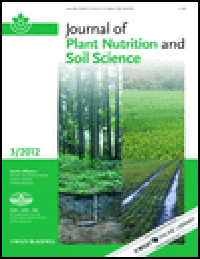
JOURNAL OF PLANT NUTRITION AND SOIL SCIENCE
Nurturing insights that drive agricultural innovation.JOURNAL OF PLANT NUTRITION AND SOIL SCIENCE, published by WILEY-V C H VERLAG GMBH, stands as a premier platform in the field of agricultural and biological sciences, focusing specifically on the intricacies of plant nutrition and soil science. With an impressive impact factor and a respected Q1 category ranking in Plant Science and Q2 category ranking in Soil Science for 2023, this journal is essential for researchers and professionals seeking to advance their understanding and foster innovative practices in sustainable agriculture. The journal’s open access options ensure a broad dissemination of knowledge, appealing to a global audience and facilitating collaborative research efforts. Embracing a broad scope that extends from foundational science to cutting-edge research developments in soil health and nutrient management, the journal serves as a critical resource for both emerging scholars and established experts, reinforcing its pivotal role in addressing the challenges of food security and environmental sustainability. With years of convergence from 1996 to 2024, it remains committed to excellence in scholarly communication, providing a vital forum for the sharing of valuable insights and advancements in the field.

CANADIAN JOURNAL OF SOIL SCIENCE
Advancing Soil Knowledge for a Sustainable FutureThe Canadian Journal of Soil Science (ISSN: 0008-4271, E-ISSN: 1918-1841) is a premier publication in the field of soil science, proudly published by Canadian Science Publishing. Established in 1974, this esteemed journal aims to promote high-quality research and insights into the dynamic interactions within soil ecosystems, addressing pressing issues such as soil health, management, and sustainability. With an impressive 2023 category quartile ranking of Q2 in Soil Science and a Scopus ranking placing it in the 52nd percentile, this journal stands out as a key resource for researchers, professionals, and students alike. Although currently not open access, the journal provides valuable content that contributes to advancing the understanding of soil science, an essential discipline for agricultural innovation and environmental stewardship. As we approach its converged years through 2024, the Canadian Journal of Soil Science is poised to continue its pivotal role in disseminating impactful research and fostering a community dedicated to soil science excellence.
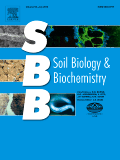
SOIL BIOLOGY & BIOCHEMISTRY
Unveiling the Secrets Beneath Our FeetSOIL BIOLOGY & BIOCHEMISTRY, published by Pergamon-Elsevier Science Ltd, is a premier academic journal that plays a pivotal role in advancing the fields of microbiology and soil science. Established in 1969, this esteemed journal has gained recognition for its rigorous publication standards and impactful research contributions, evidenced by its prestigious Q1 rankings in both Microbiology and Soil Science categories for 2023. With an impressive Scopus rank of #3 among 159 in Agricultural and Biological Sciences and #14 among 182 in Immunology and Microbiology, it boasts a notable 98th percentile in its field. The journal offers researchers, professionals, and students a vital platform for sharing innovative studies and insights about soil ecosystems and their biochemical processes, fostering greater understanding and collaboration within the scientific community. While Open Access options are currently not available, the journal remains a cornerstone for those seeking to deepen their knowledge and contribute significantly to soil biology and biochemistry.
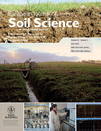
EUROPEAN JOURNAL OF SOIL SCIENCE
Uncovering Solutions for Soil SustainabilityEUROPEAN JOURNAL OF SOIL SCIENCE, published by Wiley, stands as a leading platform in the field of soil science, recognized for its contributions to the understanding of soil ecology, management, and sustainability. With an impressive impact factor and a distinguished Q1 ranking in Soil Science, this journal has recently ranked 23rd out of 159 in its category on Scopus, placing it in the 85th percentile among its peers. Covering a wide array of topics as it converges into the future, from 1994 to 2024, the journal aims to disseminate groundbreaking research and innovative methodologies that address the pressing challenges of soil degradation and environmental sustainability in Europe and beyond. Although it is not an open access journal, the EUROPEAN JOURNAL OF SOIL SCIENCE remains a vital resource for researchers, professionals, and students seeking to deepen their understanding and explore the latest advancements in soil science.
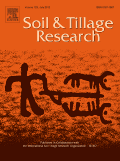
SOIL & TILLAGE RESEARCH
Unveiling the Secrets Beneath Our FeetSOIL & TILLAGE RESEARCH is a premier international journal dedicated to advancing the understanding of soil science and tillage practices through high-quality research and insightful reviews. Published by Elsevier and based in the Netherlands, this esteemed journal boasts impressive impact metrics, being ranked in the Q1 category across multiple domains including Agronomy and Crop Science, Earth-Surface Processes, and Soil Science, reflecting its pivotal role in the academic community. With an H-Index that underscores its citation impact and a Scopus ranking placing it in the top percentiles of its field, SOIL & TILLAGE RESEARCH serves as a vital resource for researchers and professionals focusing on sustainable agricultural practices, soil management, and environmental conservation. This journal provides a platform for open dialogue and dissemination of knowledge that shapes future research directions and policy-making in land use and sustainable agriculture.